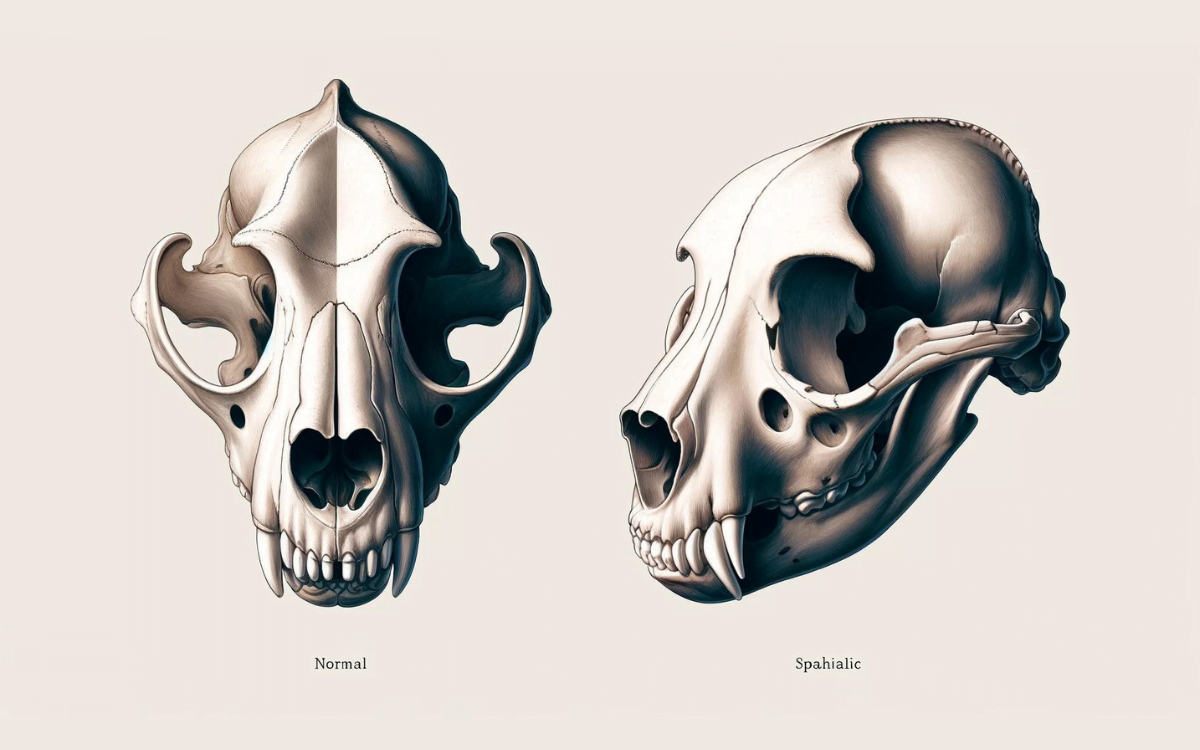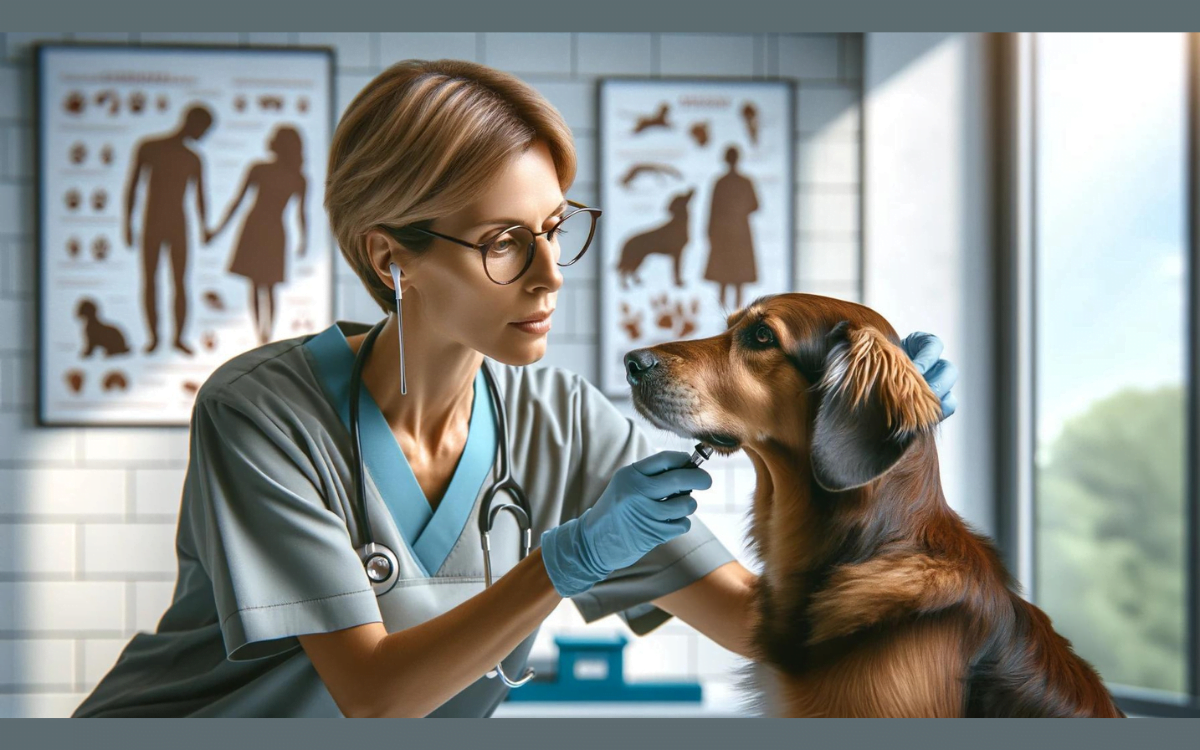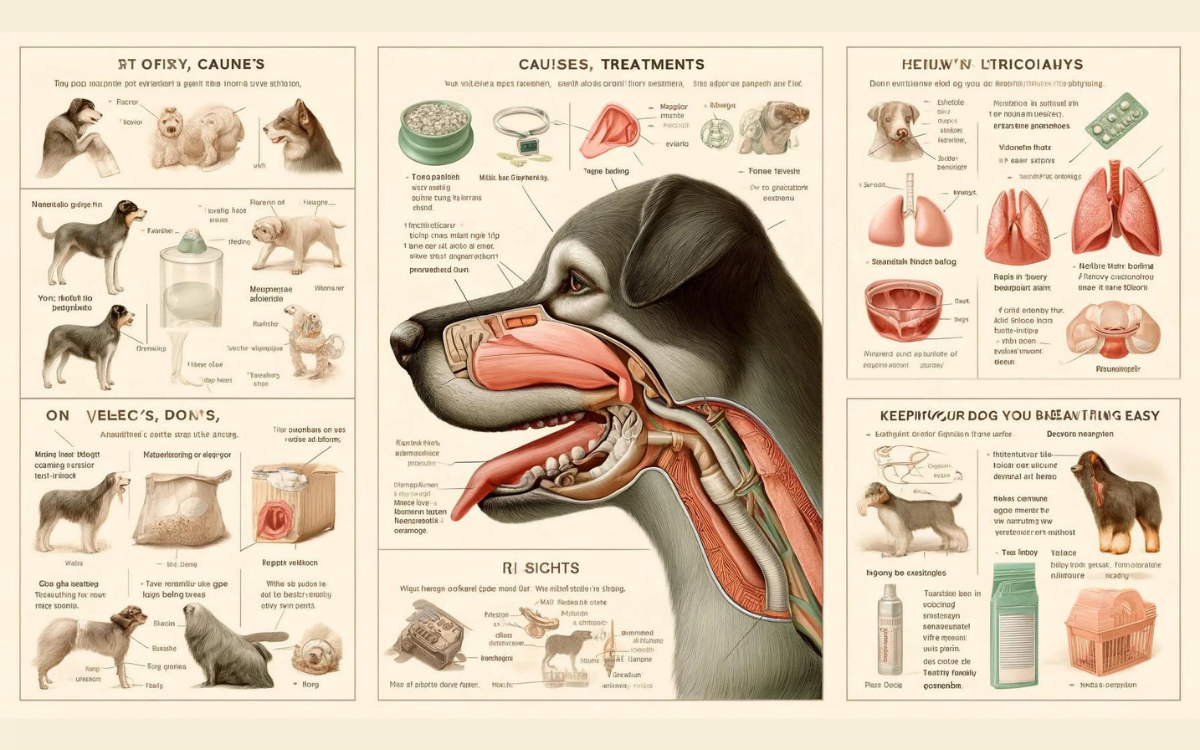Gotcha scratching your head over your pup’s peculiar snorting? We’ve all been there. While sometimes it sounds downright comical, a dog’s snort can be a signal of something more serious. But fear not, pawrents! This guide will help you decipher your dog’s snorting and determine if it’s a cause for concern. Let’s sniff out the reasons behind this funny (or concerning) sound!
First things first, not all snorting is created equal. Certain breeds, like pugs and bulldogs, have smooshed-in faces (known as brachycephaly) that naturally make them a bit more prone to snorting. This is because their shortened airways can cause some turbulence when they breathe, leading to those cute (or not-so-cute) snorting noises.

But even non-brachycephalic pups can be snorters! Excitement, exertion, and allergies can all trigger some temporary snorting. Think about it: When you get a good burst of exercise, you might start panting a bit harder. Well, for some dogs, snorting might be their way of dealing with increased airflow.
Causes of Dog Snorting
Okay, so we’ve established that not all snorting is a cause for panic. But what if your furry friend’s snorting seems a little out of the ordinary? Here’s a breakdown of some common reasons why dogs snort, along with some tips on how to tell if it’s a sign of something more serious.
Normal Causes of Snorting
- Brachycephaly: As mentioned earlier, our flat-faced friends like pugs and bulldogs are simply built for a bit more snorting. Their shortened airways can cause some obstruction during breathing, leading to those signature snorts. While not necessarily a health concern, it’s important to keep an eye on your brachycephalic pup in hot weather, as they can struggle to breathe more easily when overheated.
- Excitement and Exertion: Just like us, dogs get winded during playtime or exercise. While panting is the more common response, some dogs might resort to snorting as a way to manage increased airflow. This is usually temporary and nothing to worry about.
- Allergies: Just like humans, dogs can suffer from allergies that irritate their nasal passages. This irritation can lead to inflammation, discharge, and, you guessed it, snorting. Common allergens for dogs include pollen, dust mites, and mold.
Abnormal Causes of Snorting
Now, let’s talk about some situations where your dog’s snorting might warrant a visit to the vet.
- Respiratory Infections: Kennel cough, distemper, and other respiratory infections can cause inflammation in the upper respiratory tract. This inflammation can make it difficult for your dog to breathe, leading to snorting, coughing, and sneezing.
- Foreign Objects Lodged in the Nasal Cavity: Curious pups can sometimes inhale small objects like blades of grass, foxtails, or even tiny toys. These objects can get lodged in the nasal cavity and cause irritation, discharge, and difficulty breathing, all of which can manifest as snorting.
- Tumors: While less common, nasal tumors can also cause snorting in dogs. If your dog’s snorting is accompanied by other symptoms like facial swelling or bloody discharge, it’s crucial to see a veterinarian for a proper diagnosis.
- Collapsing Trachea: This condition, more common in small dogs and toy breeds, involves a weakening of the airway. This weakening can cause coughing, snorting, and difficulty breathing, especially during excitement or exertion.
| Sign | Normal Snorting | Abnormal Snorting |
| Frequency | Occasional, especially during playtime or exercise | Frequent, worsening over time |
| Duration | Brief and temporary | Persistent or becoming more frequent |
| Other Symptoms | None | Difficulty breathing, coughing, sneezing, lethargy, blue gums |
| Breed Predisposition | Brachycephalic breeds | Any breed |
Diagnosing the Cause of Dog Snorting
Uh oh, my dog’s snorting seems abnormal! What now? Don’t worry, pawrents! If your dog’s snorting is accompanied by other symptoms or seems out of the ordinary, a trip to the vet is the best course of action. Here’s what to expect during a veterinary visit to diagnose the cause of your dog’s snorting.
The Importance of a Veterinary Diagnosis
A veterinarian can accurately diagnose the underlying cause of your dog’s snorting and recommend the appropriate treatment. Ignoring abnormal snorting can lead to worsening symptoms and potential complications. Early diagnosis and treatment are key to ensuring your furry friend’s health and well-being.
What to Expect During a Veterinary Visit
Your veterinarian will likely ask you several questions about your dog’s snorting history and symptoms. Here are some things they might ask:
- When did the snorting start?
- How often does your dog snort?
- Has the snorting gotten worse over time?
- Are there any other symptoms, like coughing, sneezing, or difficulty breathing?
- Does your dog belong to a brachycephalic breed?

In addition to a physical examination and listening to your dog’s lungs with a stethoscope, your veterinarian might recommend some diagnostic tests depending on their findings. Here are some common tests used to diagnose the cause of dog snorting:
- X-rays: X-rays can help visualize the lungs, trachea, and nasal cavity to identify any abnormalities.
Rhinoscopy: This procedure involves inserting a small scope into the nasal cavity to directly examine the inside of the nose. - Allergy testing: If allergies are suspected, your veterinarian might recommend allergy testing to identify the specific allergens triggering your dog’s snorting.
By working together with your veterinarian, you can get to the bottom of your dog’s snorting and ensure they receive the proper treatment.
Treating Dog Snorting
Alright, so the vet diagnosed the cause of your dog’s snorting. What’s next? The good news is that there are treatment options available for both normal and abnormal causes of snorting. Here’s a breakdown of some common treatments:
Treatment for Normal Snorting
- Brachycephalic Syndrome: While there’s no cure for brachycephalic syndrome, there are ways to manage it and help reduce snorting. Weight management is crucial as excess weight can further obstruct your dog’s airways. Keeping your brachycephalic pup cool during hot weather is also important, as they can struggle to breathe more easily when overheated. Using a harness instead of a collar can also help reduce pressure on the trachea and potentially minimize snorting.
- Excitement and Exertion: The good news is, no treatment is necessary for snorting caused by excitement or exertion. Just be mindful of your dog’s limitations during playtime and exercise, especially in hot weather.
- Allergies: If allergies are the culprit behind your dog’s snorting, your veterinarian might recommend allergy medication or even immunotherapy to help manage the symptoms and reduce snorting.
Treatment for Abnormal Snorting
- Respiratory Infections: Depending on the specific infection, your veterinarian will prescribe antibiotics or other medications to fight off the infection and resolve the inflammation causing the snorting.
- Foreign Objects Lodged in the Nasal Cavity: In some cases, your veterinarian might be able to remove the foreign object with minimal sedation. However, if the object is lodged deeply or difficult to reach, anesthesia might be necessary for safe removal.
- Tumors: The treatment for nasal tumors depends on the type and severity of the tumor. Surgery, radiation therapy, or chemotherapy might all be options, depending on the specific case. Early diagnosis and treatment are crucial for the best outcome.
- Collapsing Trachea: There’s no cure for a collapsing trachea, but there are ways to manage the condition and minimize symptoms like snorting. Medications, cough suppressants, and weight management are often recommended. In severe cases, surgery might be an option.
Less Common Treatment Options
- Dental Disease: Severe dental disease, especially in the upper jaw, can irritate nasal passages and cause snorting. Addressing dental problems with professional cleaning and potential tooth extractions can help alleviate snorting caused by upper jaw irritation.
- Environmental Management: For dogs with allergies or respiratory sensitivities, using an air purifier to remove allergens and irritants from the air can help reduce snorting.
Remember, the best treatment for your dog’s snorting will depend on the underlying cause. Always follow your veterinarian’s specific recommendations for optimal results.
Living with a Dog that Snorta
Even if your dog’s snorting is under control, there are some things you can do to make their life a little easier and minimize those funny (or not-so-funny) noises. Here are some tips for living with a dog that snorts:
Tips for Managing Your Dog’s Snorting
- Regular Nasal Cleaning: With your veterinarian’s guidance, you can use a saline solution to gently clean your dog’s nasal passages. This can help remove irritants and mucus that might be contributing to snorting.
- Humidity Matters: Dry air can irritate nasal passages and worsen snorting. Consider using a humidifier in your home, especially during dry seasons, to add moisture to the air and ease your dog’s breathing.
- Elevated Food and Water Bowls: Elevating your dog’s food and water bowls can improve airflow and make breathing easier, especially for brachycephalic breeds.
- Cooling Strategies for Brachycephalic Pups: During hot weather, keep your brachycephalic friend cool with cooling vests, mats, or air conditioning. Avoid strenuous exercise in hot and humid environments.
When to Be Concerned
Even with management strategies in place, there are times when your dog’s snorting might warrant immediate veterinary attention. Here are some red flags to watch out for:
- Worsening Snorting: If your dog’s snorting seems to be getting progressively worse, it’s important to see your veterinarian to rule out any underlying issues.
- Difficulty Breathing: Any signs of difficulty breathing, such as open-mouthed breathing, rapid breathing, or labored breaths, require immediate veterinary attention.
- Lethargy: If your dog becomes lethargic or uninterested in activities they normally enjoy, it could be a sign of a more serious problem.
- Blue Gums: Blue gums are a sign of a lack of oxygen and require emergency veterinary care.
Remember, it’s always better to err on the side of caution when it comes to your dog’s health. If you’re ever concerned about your dog’s snorting or any other symptom, don’t hesitate to contact your veterinarian.
Conclusion
While a dog’s snort can be a source of amusement, it’s important to understand the potential causes behind it. By following the tips in this guide and consulting your veterinarian when necessary, you can help your furry friend breathe easier and live a happy, snort-free (or at least snort-reduced) life!
FAQ
Is my dog’s snorting a sign of allergies?
Snorting can be a symptom of dog allergies, but it’s not the only culprit. Allergies can irritate nasal passages, leading to discharge, inflammation, and that signature snorting sound. Common allergens for dogs include pollen, dust mites, and mold. If your dog’s snorting is accompanied by itchy skin, paw licking, or watery eyes, allergies might be the cause. Consult your veterinarian for allergy testing and discuss treatment options like medication or immunotherapy.
Can changing my dog’s diet help with their snorting?
Diet can play a role in allergies and respiratory issues that contribute to snorting. If your dog has allergies triggered by certain food ingredients, a diet change recommended by your veterinarian might help reduce inflammation and alleviate snorting. Additionally, maintaining a healthy weight is crucial for all dogs, but especially for brachycephalic breeds. Excess weight can put extra strain on their airways and worsen snorting. Talk to your vet about a weight management plan if your furry friend needs to shed some pounds.
How can I tell the difference between normal and abnormal snorting in my dog?
Not all snorting is created equal! Here are some things to consider:
- Frequency and Duration: Occasional snorting during playtime or exercise is likely normal. Frequent or persistent snorting, especially if it’s worsening over time, might be a sign of trouble.
- Other Symptoms: Is the snorting accompanied by difficulty breathing, coughing, sneezing, lethargy, or blue gums? These symptoms suggest a more serious issue and require immediate veterinary attention.
- Breed Predisposition: Brachycephalic breeds like pugs and bulldogs are naturally prone to some snorting due to their shortened airways. However, if their snorting seems excessive or labored, a vet visit is recommended.
Are there any home remedies for my dog’s snorting?
While there might be tempting home remedies circulating online, it’s crucial to consult your veterinarian before trying anything at home. Improper treatment could worsen your dog’s condition. Your vet can diagnose the underlying cause of the snorting and recommend the safest and most effective treatment plan.
How can I clean my dog’s nasal passages safely at home?
With your veterinarian’s guidance, you can use a saline solution to gently clean your dog’s nasal passages. This can help remove irritants and mucus that might be contributing to snorting. It’s important to use a veterinarian-approved saline solution and follow their specific instructions on how to administer it safely. Never use cotton swabs or other harsh objects in your dog’s nose, as this can cause irritation and damage.

Healthy dogs mean happy dogs, and that makes me happy! I’m here to share all the tips for keeping your best furry friend in top shape, from puppyhood to their golden years.

